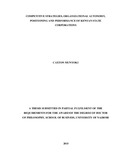| dc.description.abstract | Firms operate within an environment that influences their operations either positively or
negatively depending on the nature of their business. Identification of specific
competitive strategies in tandem with particular organizational autonomy and positioning
strategies may explain variations in organizational performance. The main objective of
this study was to determine the role of organizational autonomy and positioning on the
relationship between competitive strategies and performance of Kenyan State
Corporations. This study was guided by positivist philosophy. The positivist school of
thought is based on the assumption that only one reality exists, though it can only be
known imperfectly due to human limitations and researchers can only discover this
reality within the realm of probability. The study adopted a descriptive cross-sectional
census survey on a population of 187 Kenyan State Corporations across the public sector.
The study used primary data collected by questionnaires administered to the Chief
Executive Officers of the State Corporations. The study also used secondary data on
performance collected from annual performance contract reports for State Corporations
for the five performance contracting cycles between 2009 and 2014 from the Department
of Performance Contracting in the Ministry of Planning and Devolution. The results
indicated that competitive strategies had statistically significant effects on the
performance of Kenyan state corporations. The results further indicated that though
positioning is an important strategy, it did not mediate between competitive strategies and
performance of the Kenyan state corporations but organizational autonomy moderated
between competitive strategies and the Kenyan state corporations. The combined effect
of the three predictor variables was greater than the individual influence of each predictor
variable on the performance of Kenyan state corporations. The stakeholder‘s theory has
gained substantial boost from the study because Kenyan State Corporations are formed to
benefit the stakeholders who in this case are Kenyan citizens. Further, RBV theory has
benefited from the findings that, the principle should dedicate enough resources for the
State Corporations to achieve their obligations. Structural contingency theory benefits
from the study because it is clear that performance is determined by environment and that
autonomy, positioning and competitive strategies deal with technology, people and work
cultures. Strategic conflict model has been supported by the study because some
corporations share the same environments and strategies but the outcomes are different
because rational thinking is influenced by time and managers‘ decisions. Agency Theory
is supported by the fact that the concept of agency loss is the difference between the best
possible outcome for the principle and the consequences of the acts of the agent. At
policy level, the Government will benefit from the study by developing guidelines and
policies to define the required competitive strategies. Management will benefit from this
study because they could use it to formulate internal organizational processes that would
guide the positioning of the organization. Performance was tested as a composite score as
reported by the Performance Contracting Department. It would be interesting if the
individual competitive strategies dimensions were tested against the raw score of each of
the six performance areas in the performance contracts. Since the context of the study
was Kenyan State Corporations future research could be undertaken to replicate this to
compare performance of Kenyan State Corporations with that of public quoted
companies at the Securities Exchange or other sectors of the economy to check whether
the findings would be the same. Further, a similar study could be replicated but in a
different context, such as a private companies in Kenya using the same variables. | en_US |

